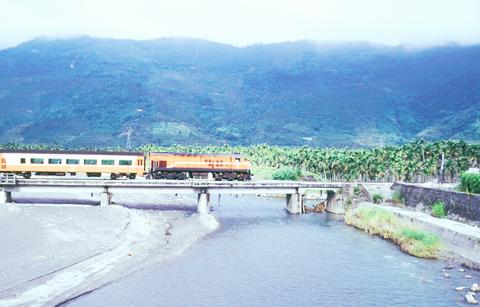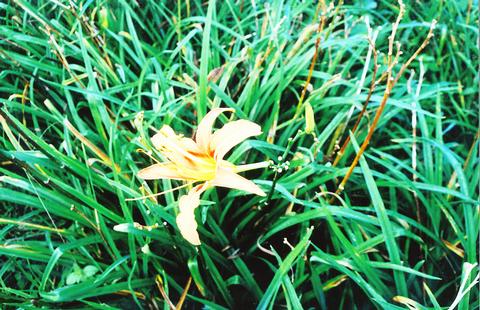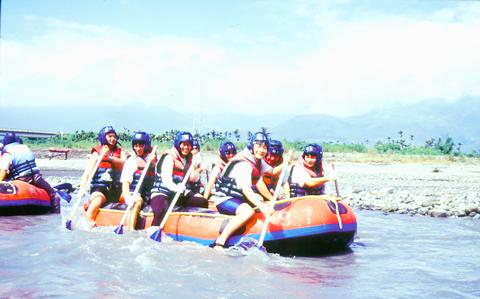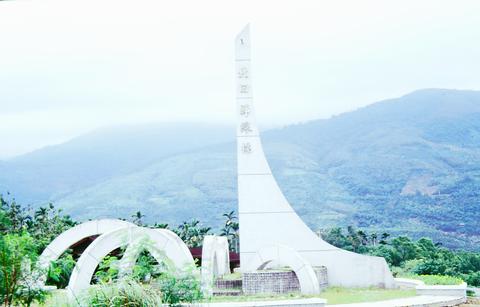The Hualien-Taitung Rift Valley (花東縱谷) stretches over 240km along Taiwan's southeastern coast. As well as being of immense geological interest, the valley is also culturally diverse. This region is often called "Taiwan's back garden," and there is certainly no shortage of surprises.
One of the best ways to appreciate the scenery that the area has to offer is by train, riding with the windows down. While an express train will whisk you past the many fascinating stops along the way, the Hualien-Taitung line of the Taiwan Railway Administration (台鐵) offers curious travelers a local, slower train in both the morning and evening.

Embarking at 6:45am from Hualien on a cool, mid-Autumn Sunday morning, I found myself the only passenger in a two-carriage Kuanghua-class (光華號) local train.

Heading south, the East Coast Mountain Range stands to your left, near and sharp. To the right, massive and imposing, looms the Central Mountain Range. Near the rails, many fields lay fallow, but bananas, papaya and late-season rice can be seen in the distance.
The Hualien-Taitung rail line seems to work in harmony with nature, following a path down a valley that was millions of years in the making. The beauty of the valley and earnestness of the people working on the line are enough to humble even a hardened traveler.

PHOTOS: GARY HEATH
Liu Chih-tian (劉進添), a train supervisor and 38-year veteran of the line, tells how maintaining the railway line is a never-ending job, with typhoons and mudslides an interminable problem throughout the valley. A look at the sheared sides of the mountains lining the railway confirm this.

PHOTO: GARY HEATH
I bid farewell both to Liu and the engineer at Kuangfu, the first of the line's major southbound stops, and later headed on to Juisui. A thriving tourist center, Juisui is famous as a launch point for whitewater rafting on the Hsiukuluan River (
One of the more well-known of these is the Juisui hot spring. Set in a landscaped garden, it has wooden cubicles and an outdoor pool. Best of all, it has reasonably priced rooms available for travelers. Hong-yeh Hot Spring (紅葉溫泉), a more spartan establishment located nearby, offers some variety with its clear spring water.
Other Juisui highlights include the Tropic of Cancer Stone Marker, a few Stonehenge-like Aboriginal stone circles, various tea farms and the Juisui Dairy Farm (瑞穗農場). Of these, the latter two are the more interesting.
On the outskirts of Juisui is the Hehshan Leisure Tea Garden (鶴山休閒渡假茶園), an excellent place to spend time in the winter due to the area's mild climate. Here you can pick your own tea and enjoy learning all you might want to know about tea growing. You can also stay overnight at the farm.
The Juisui Dairy Farm, a fine ride by bicycle from the town center, is reminiscent of the English countryside with its cows, tractors, and green pastures, but the flocks of cranes and surrounding mountains are distinctive Taiwan markings.
The fresh milk available at the farm is also a rare treat.
But it is whitewater rafting that everyone comes to Juisui to do. This is not particularly easy if you are on your own, but after asking around, one tour company took pity on me and threw me in with a Taiwanese tour group. In no time, we were helmeted and in the river.
I wanted out of the boat after five minutes. Halfway down the Hsiukuluan, I begged off, saying I had to take some photos from the riverbank. Aimlessly floating down a potentially dangerous river with a bunch of casual tourists was not an attractive option.
The rafting aside, what makes the experience is the undeniably impressive locale. The Hsiukuluan, at 120km, is the longest river in eastern Taiwan. It is the only river to cut through the East Coast Mountain Range and provides ample opportunity to see sheer cliffs, unique flora and fauna up close and unspoiled.
Back on the train, I headed an hour south to Yuli, another slow-paced town of 30,000, where I booked a motel room and borrowed a bike to ride out to the hot spring at Antung. The springs, reached by a challenging one-hour bike ride, are clear enough to drink and are famous for their healing properties.
Splendid vistas make stopping at Yuli a treat. Mountains on both sides of the valley can be explored by bicycle, car or on foot. Whatever your mode of transport, you are bound to find an adventure.
On a fantastically fine morning, Chang Cheng-lang (
Though the farm is a mere five hectares, Chang, with the help of his wife and son, eke out a good living by growing and selling the famous chin cheng hua (
After surveying the hills and trees, I was invited to sample the flower, first deep-fried, then stir-fried and finally in a soup. They tasted a bit like eggplant but only made me hungry for the excellent locally grown watermelon, corn and pomelo.
I enjoyed the afternoon train ride from Yuli as rain showers glazed the rice fields surrounding Fuli. The train crossed the valley over a nearly dry riverbed, and crept down to Chihshang, a tiny town famous for its rice.
Another short jaunt down the line brings you to Kuanshan, the last main station before Taitung. At Kuanshan, hiring a bicycle to tour the local countryside is popular with tourists and there are plenty of places to rent one near the station. There is also a cycling park near the railway.
Good weather had held for most of my trip, but the rain finally caught up with me and I made a beeline for the station to take the next express train back to Hualien. Taitung could wait for another day.
For those interested in exploring the valley, three kinds of trains leave Hualien for Taitung on a daily basis; local, semi-express and express class. All trains stop at Kuangfu, Fenglin, Yuli, Fuli, Chihshang, Kuanshan and Taitung New Station. There are also two local trains departing Hualien for Yuli each day in the morning and afternoon. Check with the Taiwan Railway Administration for the latest schedule.
Reasonably priced accommodation can be found at any motel near a railway station along the line. Accommodation is also available at most hot spring resorts or leisure farms. Those listed below all have rooms for around NT$1,000 per night.
Several companies run whitewater rafting trips in Juisui. If you want to go whitewater rafting, getting together a group of at least four people is advisable. Whitewater rafting is most popular in the peak summer season, but the companies run trips year round. Cost is a minimum NT$750 per person.

Words of the Year are not just interesting, they are telling. They are language and attitude barometers that measure what a country sees as important. The trending vocabulary around AI last year reveals a stark divergence in what each society notices and responds to the technological shift. For the Anglosphere it’s fatigue. For China it’s ambition. For Taiwan, it’s pragmatic vigilance. In Taiwan’s annual “representative character” vote, “recall” (罷) took the top spot with over 15,000 votes, followed closely by “scam” (詐). While “recall” speaks to the island’s partisan deadlock — a year defined by legislative recall campaigns and a public exhausted

Hsu Pu-liao (許不了) never lived to see the premiere of his most successful film, The Clown and the Swan (小丑與天鵝, 1985). The movie, which starred Hsu, the “Taiwanese Charlie Chaplin,” outgrossed Jackie Chan’s Heart of Dragon (龍的心), earning NT$9.2 million at the local box office. Forty years after its premiere, the film has become the Taiwan Film and Audiovisual Institute’s (TFAI) 100th restoration. “It is the only one of Hsu’s films whose original negative survived,” says director Kevin Chu (朱延平), one of Taiwan’s most commercially successful

In the 2010s, the Communist Party of China (CCP) began cracking down on Christian churches. Media reports said at the time that various versions of Protestant Christianity were likely the fastest growing religions in the People’s Republic of China (PRC). The crackdown was part of a campaign that in turn was part of a larger movement to bring religion under party control. For the Protestant churches, “the government’s aim has been to force all churches into the state-controlled organization,” according to a 2023 article in Christianity Today. That piece was centered on Wang Yi (王怡), the fiery, charismatic pastor of the

The primaries for this year’s nine-in-one local elections in November began early in this election cycle, starting last autumn. The local press has been full of tales of intrigue, betrayal, infighting and drama going back to the summer of 2024. This is not widely covered in the English-language press, and the nine-in-one elections are not well understood. The nine-in-one elections refer to the nine levels of local governments that go to the ballot, from the neighborhood and village borough chief level on up to the city mayor and county commissioner level. The main focus is on the 22 special municipality